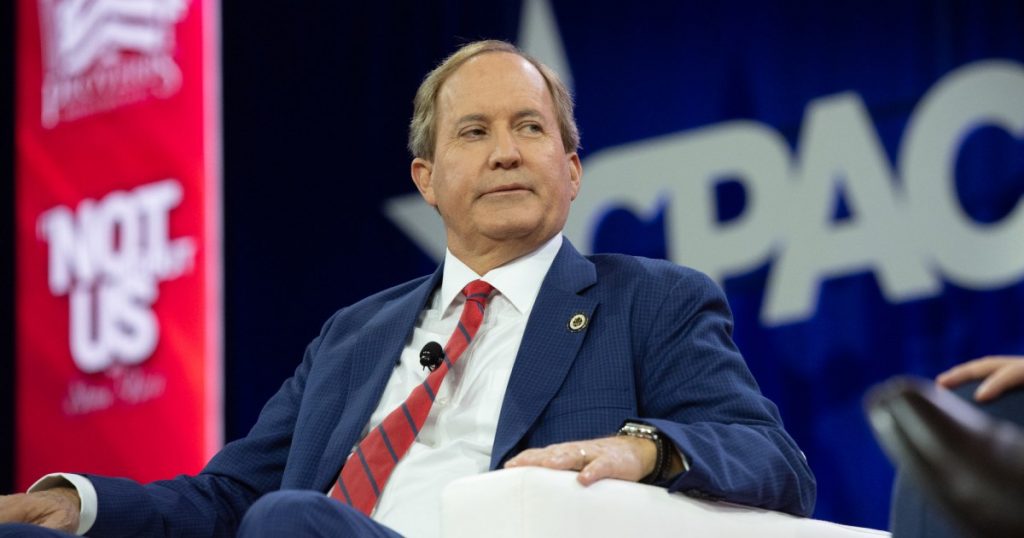Ken Paxton Is Going to Take Some Classes on How to Be More Ethical
Zach D Roberts/NurPhoto via ZUMA Press
Fight disinformation: Sign up for the free Mother Jones Daily newsletter and follow the news that matters.On Tuesday, nine years after Texas Attorney General Ken Paxton was indicted for securities fraud, and just a few weeks before he was finally set to go on trial, prosecutors struck a deal with the powerful Republican to call the whole thing off. Under the terms of the pre-trial agreement, as reported by Texas Tribune, Paxton will avoid any admission of wrongdoing but will have to do 100 hours of community service and pay $300,000 in restitution to the people who made investments at his encouragement—including his former roommate. He will also have to go back to school. Specifically, Paxton has to take 15 hours of classes on legal ethics.
Remedial legal education is an appropriate prescription for Paxton, who has earned a reputation as one of the most shameless political figures in American public life. Paxton’s willingness to go where more scrupulous lawyers might hesitate has made him a valued official in Donald Trump’s party. His sloppy and transparently bad-faith effort to get the Supreme Court to throw out the electoral college votes of swing-states won by Joe Biden helped pave the way for January 6th. (He was rewarded with a speaking slot on the National Mall hours before the riot.) Paxton has not necessarily been as effective an attorney general as his predecessors, Sen. John Cornyn and Gov. Greg Abbott, were. But he has succeeded at his own task: to unmoor the position from the realm of public service entirely. As the electoral-college suit laid bare, the position of attorney general in Texas is verging on a for-hire lawsuit mill. (Consider his recent eagerness to carry water for Elon Musk against Media Matters.)
Paxton’s settlement brings to an end a saga that dates all the way back to his time in the state senate. As I explained in a profile for the magazine, during his campaign for AG in 2014, he admitted wrongdoing and paid a $1,000 fine for acting as an unregistered securities broker after an investigation from the State Securities Board found that he had operated as an unlicensed investment adviser on at least three separate occasions. In 2015, a grand jury in his home turf of Collin County indicted him.
While it was certainly not ideal to have a state attorney general who seemed incapable of following securities law the actual charges hanging over Paxton were sort of small potatoes. The Tribune noted that felonies like the one Paxton was charged with don’t often result in jail time. The bigger scandal was what happened afterwards, as Paxton’s friends, allies, and donors launched a years-long counteroffensive that at turns defunded and stymied the prosecution. That’s why the case dragged on into Exxon-Valdez territory—not because the charges were so complicated, but because, among other things, a campaign donor who built a model community in the Dallas suburbs styled on a Croatian fishing village convinced the Collin County government to cut off funding to the special prosecutors working the case. Other Paxton allies ended up suing one of the alleged victims of the securities fraud case, over a different deal. For the original Paxton case to move forward, there were always like seven more things that needed to be resolved first.
It was a never-ending saga of jurisdictional issues and funding fights. Paxton, or his attorneys, often complained that they simply wanted their day in court. But not getting their day in court was a pretty effective strategy.
And the securities case was only one of Paxton’s legal issues. He is still the subject of a whistleblower lawsuit from former staffers who allege that he fired them in 2016 after they reported him to the FBI. His employees were concerned by a pattern of suspicious activity involving Paxton and a major donor. Among other things, the whistleblowers noted that the donor had hired a woman with whom Paxton had allegedly had an affair, and that their boss had taken to using burner phones to coordinate meetings. (The donor, Austin real-estate developer Nate Paul, was indicted by the Department of Justice last year on eight counts of making false statements and four counts of wire fraud, and has pleaded not-guilty.) And as Cornyn noted in a post on X earlier this year, Paxton is also reportedly the subject of a federal investigation, stemming from the whistleblower allegation.
Ken, your criminal defense lawyers are calling to suggest you spend less time pushing Russian propaganda and more time defending longstanding felony charges against you in Houston, as well as ongoing federal grand jury proceedings in San Antonio that will probably result in… https://t.co/6dfvvqJSfV
— Senator John Cornyn (@JohnCornyn) February 13, 2024
Just as Paxton’s allies went after the prosecutors to undercut his securities case, he and his supporters—foremost among them the oil billionaire Tim Dunn—are working to cull the anti-Paxton forces within his own party. Last year, the Texas House of Representatives impeached him, citing the allegations raised in the whistleblower suit—but Republicans in the state senate overwhelmingly acquitted him, and now Paxton and co. are on offense. Ahead of the March primary, he backed primary challenges to 37 state House Republicans who voted for impeachment; eight of those incumbents lost, and another eight have been forced into a runoff—including the Republican speaker of the house, Dade Phelan.
Paxton’s ethics issues have gone from an uncomfortable stench to a kind of loyalty test. It’s a tidy little snapshot of the whole Trump era.





